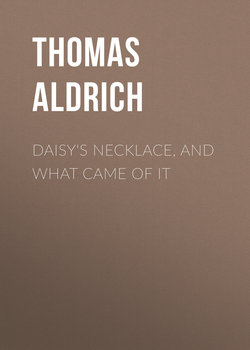Читать книгу Daisy's Necklace, and What Came of It - Aldrich Thomas Bailey - Страница 6
IV
ОглавлениеThe Almighty Dollar.
Washington Irving.
The age is dull and mean. Men creep,
Not walk; with blood too pale and tame
To pay the debt they owe to shame;
Buy cheap, sell dear; eat, drink, and sleep
Down-pillowed, deaf to moaning want;
Pay tithes for soul-insurance; keep
Six days to Mammon, one to Cant.
J. G. Whittier.
Every one is as God made him, and oftentimes
A great deal worse.
Miguel De Cervantes.
IV.
A FEW SPECIMENS OF HUMANITY
Down Town – Messrs. Flint & Snarle – Tim, the Office Boy, and the pale Book-Keeper – The Escritoire – The Purloined Package – Mr. Flint goes Home – Midnight – Miss Daisy Snarle – The Poor Author.
In one of those thousand and one vein-like streets which cross and recross the mercantile heart of Gotham, is situated a red brick edifice, which, like the beggar who solicits your charity in the Park, has seen better days.
In the time of our Knickerbocker sires, it was an aristocratic dwelling fronting on a fashionable street, and "Jeems," in green livery, opened the hall door. The street was a quiet, orderly street in those days – a certain air of conscious respectability hung about it. Sometimes a private cabriolet rolled augustly along; and of summer evenings the city beaux, with extraordinary shoe-buckles, might have been seen promenading the grass-fringed sidewalks. To-day it is a miasmatic, miserable, muddy thoroughfare. Your ears are startled by the "Extray 'rival of the 'Rabia," and the omnibuses dash through the little confined street with a perfect madness. Instead of the white-kidded, be-ruffled gallants of Eld, you meet a hurrying throng of pale, anxious faces, with tare, tret and speculation in their eyes.
It is a business street, for Mammon has banished Fashion to the golden precincts of Fifth Avenue. The green of Jeems' livery is, like himself, invisible. He has departed this life – gone, like Hiawatha, to the Land of the Hereafter – to the land of spirits, where we can conceive him to be in his element; but he has a "town residence" in an obscure graveyard, with his name and "recommendation" on a stone door-plate. His mundane superiors are reclining beneath the shadow of St. Paul's steeple, where they are regaled with some delectable music (if you would only think so) from the balcony of the Museum opposite, and have the combined benefit of Barnum's scenic-artist and the Drummond light.
The massive door-plate, and highly polished, distorted knocker, no longer grace the oaken panels of number 85; but a republican sign over the family-looking doorway tells you that "the front room, second floor," is occupied by Messrs. Flint & Snarle. After passing up a flight of broad, uncarpeted stairs, you again see the name of that respectable firm painted on a light of ground glass set in the office door. Once on the other side of that threshold, you breathe mercantile air. There have been so many brain-trying interest calculations worked out on those high desks, that the very atmosphere, figuratively speaking, is mathematical.
The sign should not read Flint & Snarle, for Snarle has been dead six months, and it is not pleasant to contemplate a name without an owner – it is not to every one, but Mr. Flint likes to read the sign, and think that Snarle is dead. He was the reverse of Flint, and that his name should have been Snarle at all is odd, for in life he was the quintessence of quietness, and the oil of good nature. But Flint is well named; he is chalcedony at heart. Nobody says this, but everybody knows it. Nell, the pretty match-girl, who sells her wares in Wall-street, never approaches him, nor the newsboys; and blind men, with sagacious, half-fed dogs, steer clear of him by instinct. He doesn't tolerate paupers, and Italian hand-organs with monkey accompaniments – not he.
The man who has not as much money as the surviving senior of Flint & Snarle, is a dog – in Flint's distinguished estimation. His God is not that divine Presence, whose thought
"Shaped the world,
And laid it in the sunbeams."
Flint's God is Gold. —
"Gold! Gold! Gold! Gold!
Bright and yellow, hard and cold,
Molten, graven, hammered and rolled;
Heavy to get, and light to hold;
Hoarded, bartered, bought and sold;
Stolen, borrowed, squandered, doled;
Spurned by the young, but hugged by the old
To the very verge of the church-yard mould;
Price of many a crime untold:
Gold! Gold! Gold! Gold!"
Flint is about fifty-three years of age; but if you could forget his gray hair, and look only at those small, piercing black eyes, you would hardly think him forty. His black dress-coat is buttoned around his somewhat attenuated form, and he wears a stiff white cravat because it looks religious. In this respect, and perhaps in others, you will find Flint's prototype on every corner – people who look religious, if religion can be associated with the aspect of an undertaker.
It is Monday morning.
Mr. Flint sits in his private office reading the letters. There is a window cut in the wall, and he glances through it now and then, eyeing the book-keeper as if the poor careworn fellow were making false entries. On a high consumptive-looking stool sits the office boy, filing away answered letters and sundry bills paid. The stool seems so high and the boy so small, that he at once suggests some one occupying a dangerous position – at a mast-head or on the golden ball of a church-steeple. For thus risking his life, he receives "thirty dollars per year, and
